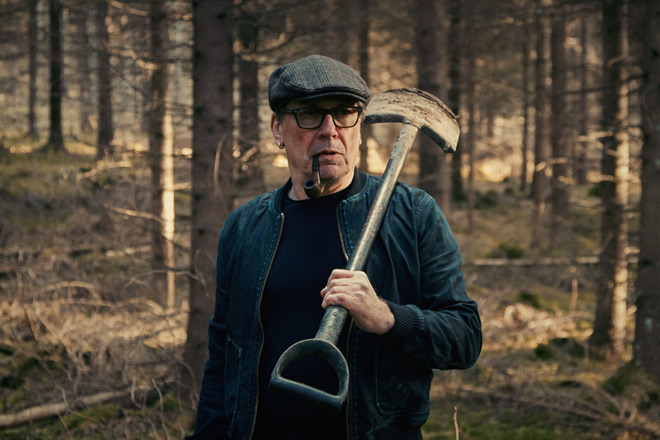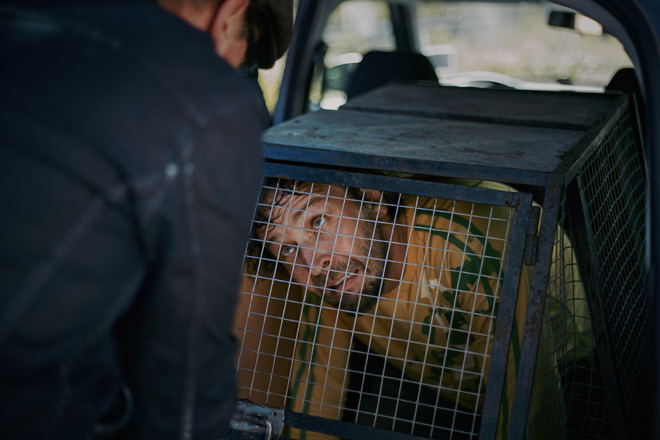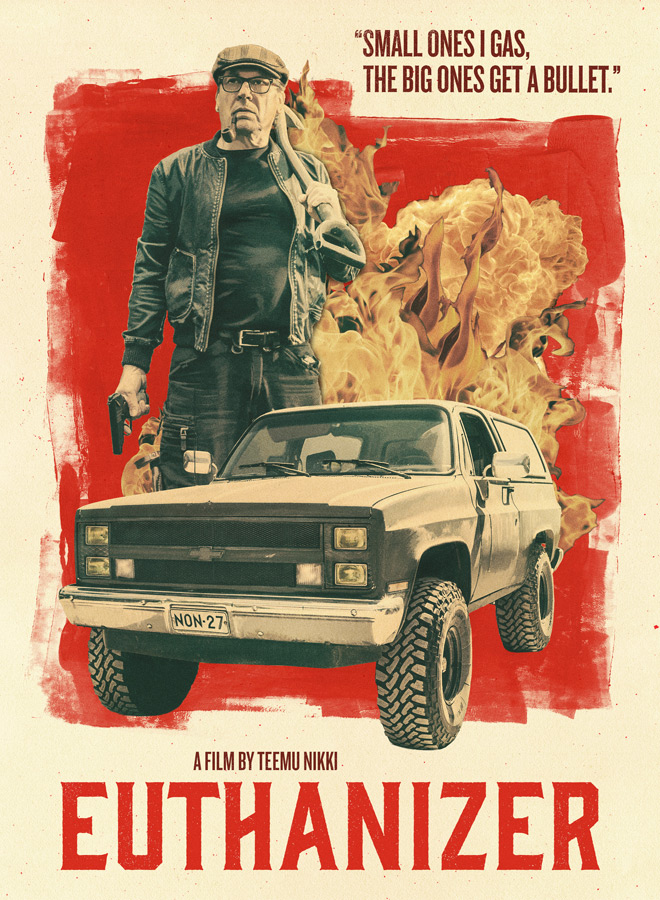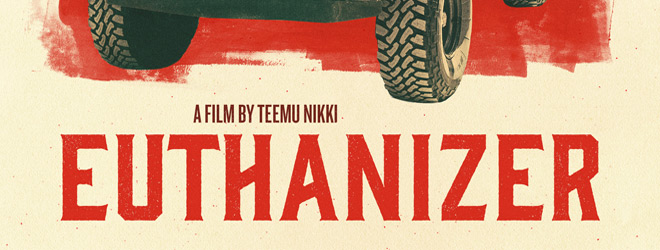Scientists call it the “anthropocene,” our current age where human beings possess a dominant influence on climate and the environment. It flows with a biblical idea that humans are separate from the planet’s other animals. Showing no mercy, the award winning Finnish Thriller Euthanizer is a dark meditation on people through this relationship.
In select theaters Friday, July 20, 2018 and on VOD August 7th via Uncork’d Entertainment, Euthanizer tells the story of Veijo Haukka (Matti Onnismaa: Vares: Gambling Chip 2012, The Kiss of Evil 2011), a mechanic who euthanizes animals on the side. When Petri (Jari Virman: The Liberation of Skopje 2016, Concrete Night 2013), a white supremacist gang member, demands Veijo kill his perfectly healthy dog, Veijo keeps the dog instead, and everything goes to hell.

Right away, Euthanizer screams “exploitation.” Using animals, especially dogs, to engage an audience’s sympathy can feel cheap. First-time feature Director Teemu Nikku is in complete control, though. His use of innocent animals in service of a dark morality play lends one more layer of complexity to Veijo’s grim tale.
There is minimal style in Nikku’s matter-of-fact Euthanizer. It allows for an almost objective look into the life of Veijo and those surrounding him. The man operates by a simple ethical code that perhaps causes him to shoulder the burden of euthanizing sick and dying animals. He does not share his compassion and tenderness for animals with people. That Veijo has had a rough life is evident. But this feels like his world.
It is a testament to Matti Onnismaa’s quiet, almost stoic performance that the character of Veijo feels so real. He is truly strained and beset from all sides. He ambivalently cares for his sick father Martti (Heikki Housiainen: Letters to Father Jacob 2009, Under the North Star 2009). Veijo begins sleeping with the nurse Lokka (Hannamaija Nikander: Lovemilla 2015, Tits 2014) tasked to care for the man. Her sexual tastes push Veijo and his response is tense, to say the least. Veijo can not seem to escape death or at least the specter of it. She is no passive love interest either. Her character is as well realized. Possibly as a result of an action Lokka takes, Veijo ultimately negotiates the limits of his code.
That leaves Petri and his gang of white supremacists. Petri is a man with a wife and kids, elements traditionally symbolic of maturity. However, he is both spineless and lazy. He wants his dog dead because she is an inconvenience. He does not want to pay to have her spayed. His gang wears shirts like they are in a club more than a gang. They bully and harass him, yet he still wants to be among them. He is a child and they act like children.

Nikku clearly shows how infantile their entire mentality is. In a way, that Petri has a family suggests creating life is not a sign of any real maturity. It is how one handles that life afterward. Petri’s refusal to pay for his dog to be spayed (his part to control the pet population) and urge for euthanasia as a solution shows what kind of man he is.
Though he does struggle with wanting the dog dead, life and death are transactional in his eyes. He knows the poor animal is innocent. In fact, as in life, the animals are the innocents because they don’t know any better. Contrast Petri’s attitude with Veijo, who is extremely critical of anyone he perceives as not respecting these animals. He can not bring himself to kill Petri’s healthy dog, so he undertakes the responsibility of caring for the animal. That is what an adult does. Adults do not just abandon animals when they become inconvenient. One may as well abandon their humanity.
This is the main dilemma. Petri, a punching bag for the gang, is desperate to gain their respect. He should be aching to gain the respect of his family. They detect his ruse immediately when Veijo brings the dog by his auto shop. It is almost as if Petri can not stand his family either, like he would rather return to a life of drunken carelessness the gang seems to enjoy.
That said, Veijo is not a perfect hero. Life and death are constantly at odds throughout Euthanizer. Veijo’s disgust with virtually everyone is clear in his face throughout. He barely has time for Lokka; he keeps his glasses and hat on during sex with her, obscuring his face to her. Veijo tries to be someone she can’t know, perhaps as a defense. Veijo is a man at once cut off from this world and yet forced to exist within it. Putting animals out of their misery seems the least he can do. He even says he’d get arrested for putting a bullet in someone’s head. It’s not the same for animals.

These rules are put to the test, though, building something bleak and violent. Although, Euthanizer is not so cut and dry. There is a wounded heart at its core, yes, but also a darkly subtle comic vibe to it. Without fail, Veijo sees in the doomed animals brought to him the poor wretched manner of their treatment. One gerbil has never had a companion, which they need. One dog is lethargically ill because it was bred out of incest in a puppy mill. This may not be a straight Horror film, but it is a world informed by and choking in horror. No wonder Veijo keeps to himself and works on cars.
Overall, Euthanizer is a tough watch, but something that feels vital. The performances are great across the board. It never feels like Nikku is trying to club viewers with a message. Instead, he allows the moral questions at its core to breathe through the situations and behavior of the people populating his world. For these reasons, CrypticRock gives Euthanizer 4 out of 5 stars.






No comment